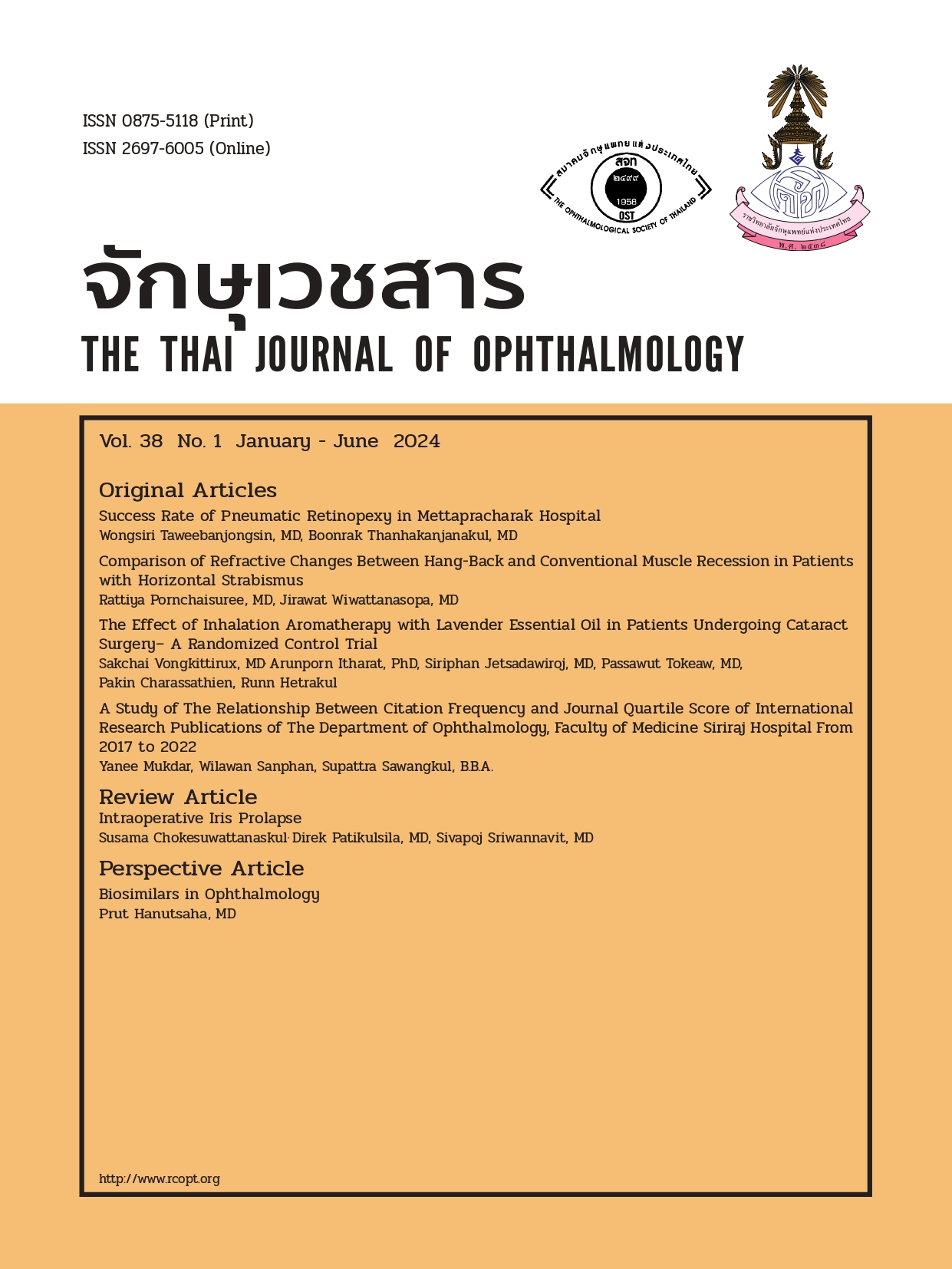Biosimilars in Ophthalmology
Keywords:
Biosimilars, OphthalmologyAbstract
ยาชีววัตถุ เรียกในภาษาอังกฤษว่า Biopharmaceuticals หรือ biological medical products ซึ่งมักเรียกกันสั้น ๆ ว่า biologics หมายถึง ผลิตภัณฑ์ยาที่ผลิตใน สกัดจาก หรือกึ่งสังเคราะห์ (semisynthetic) จากแหล่งกำเนิดทางชีววิทยา1 องค์การอนามัยโลกอธิบายว่ายาชีววัตถุ หมายถึง ยาซึ่งสร้างขึ้น และทำให้บริสุทธิ์จากการเพาะเลี้ยงเซลล์ ได้แก่ แบคทีเรีย ยีสต์ หรือเซลล์ของพืชหรือสัตว์ ซึ่งเป็นการผลิตในระดับใหญ่ (large scale)2 ยาในกลุ่มนี้ได้แก่ วัคซีน สารกระตุ้นภูมิคุ้มกัน (allergen) ผลิตภัณฑ์จากเลือด จากเซลล์ รวมทั้งการบำบัดด้วยเซลล์ (cell therapy) การบำบัดด้วยพันธุกรรม (gene therapy)
เป็นต้น ยาชีววัตถุอาจประกอบด้วยน้ำตาล โปรตีน หรือ กรดนิวคลีอิก ซึ่งรวมกันเป็นโครงสร้างที่ซับซ้อน หรือ อาจเป็นส่วนของเซลล์หรือเนื้อเยื่อที่มีชีวิต องค์การเพื่อการประเมินผลิตภัณฑ์จากยาแห่งสหภาพยุโรป (The European Agency for the Evaluation of Medicinal Products, EMEA) ให้คำจำกัดความของยาชีววัตถุว่า หมายถึง ผลิตภัณฑ์ใด ๆ ที่มีส่วนประกอบโปรตีนที่ได้จากเทคโนโลยีชีวภาพเป็นส่วนประกอบสำคัญ1
References
Sharma A, Kumar N, Kuppermann BD, Bandello F, Loewenstein A. Understanding biosimilars and its regulatory aspects across the globe: an ophthalmology perspective. Br J Ophthalmol. Jan 2020;104(1):2-7. doi:10.1136/bjophthalmol-2019-3144432. World Health Organization. Biologicals. Accessed
May 2024, https://www.who.int/health-topics/biologicals#tab=tab_1
Goeddel DV, Kleid DG, Bolivar F, et al. Expression in Escherichia coli of chemically synthesized genes for human insulin. Proc Natl Acad Sci U S A. Jan 1979;76(1):106-10. doi:10.1073/pnas.76.1.106
Quianzon CC, Cheikh I. History of insulin. J Community Hosp Intern Med Perspect. 2012;2(2)doi:10.3402/jchimp.v2i2.18701
Sharma A, Reddy P, Kuppermann BD, Bandello F, Lowenstein A. Biosimilars in ophthalmology: “Is there a big change on the horizon?”. Clin
Ophthalmol. 2018;12:2137-2143. doi:10.2147/OPTH. S180393
Rosenfeld PJ, Moshfeghi AA, Puliafito CA. Optical coherence tomography findings after an intravitreal injection of bevacizumab (avastin) for neovascular age-related macular degeneration. Ophthalmic Surg Lasers Imaging. Jul-Aug 2005;36(4):331-5.
Kaiser PK. Antivascular endothelial growth factor agents and their development: therapeutic implications in ocular diseases. Am J Ophthalmol. Oct 2006;142(4):660-8.
Vedula SS, Krzystolik MG. Antiangiogenic therapy with anti-vascular endothelial growth factor modalities for neovascular age-related macular degeneration. Cochrane Database Syst Rev. Apr 16 2008;(2):CD005139. doi:10.1002/14651858. CD005139.pub2
Virgili G, Parravano M, Menchini F, Brunetti M. Antiangiogenic therapy with anti-vascular endothelial growth factor modalities for diabetic macular oedema. Cochrane Database Syst Rev. 2012;12:CD007419. doi:10.1002/14651858.CD007419.pub3
Braithwaite T, Nanji AA, Lindsley K, Greenberg PB. Anti-vascular endothelial growth factor for macular oedema secondary to central retinal vein occlusion. Cochrane Database Syst Rev. 2014;5:CD007325. doi:10.1002/14651858.CD007325.pub3
Martinez-Zapata MJ, Marti-Carvajal AJ, Sola I, et al. Anti-vascular endothelial growth factor for proliferative diabetic retinopathy. Cochrane
Database Syst Rev. Nov 24 2014;(11):CD008721. doi:10.1002/14651858.CD008721.pub2
Gamez-Belmonte R, Hernandez-Chirlaque C, Arredondo-Amador M, et al. Biosimilars: Concepts and controversies. Pharmacol Res. Jul 2018;133:251-264. doi:10.1016/j.phrs.2018.01.024
de Mora F. Biosimilar: what it is not. Br J Clin Pharmacol. Nov 2015;80(5):949-56. doi:10.1111/bcp.12656
Hatamnejad A, Dadak R, Orr S, Wykoff C, Choudhry N. Systematic review of efficacy and meta-analysis of safety of ranibizumab biosimilars relative to reference ranibizumab anti-VEGF therapy for nAMD treatment. BMJ Open Ophthalmol. Jun 2023;8(1) doi:10.1136/bmjophth-2022-001205
Chakraborty D, Stewart MW, Sheth JU, et al. Real-World Safety Outcomes of Intravitreal Ranibizumab Biosimilar (Razumab) Therapy for Chorioretinal Diseases. Ophthalmology and therapy. Jun 2021;10(2):337-348. doi:10.1007/s40123-021-00345-2
Sharma S, Khan MA, Chaturvedi A, Group R-ESI. Real-Life Clinical Effectiveness of Razumab(R) (the World’s First Biosimilar of Ranibizumab) in Retinal Vein Occlusion: A Subgroup Analysis of the Pooled Retrospective RE-ENACT Study. Ophthalmologica. 2019;241(1):24-31. doi:10.1159/000488602
Sharma S, Sharma T, Prasad S, Gopalakrishnan M, Chaturvedi A. Treatment Landscape of Macular Disorders in Indian Patients with the Advent of Razumab (World’s First Biosimilar Ranibizumab): A Comprehensive Review. Ophthalmology and therapy. Sep 2021;10(3):431-443. doi:10.1007/s40123-021-00362-1
Ferreira LB, Smith AJ, Smith JR. Biologic Drugs for the Treatment of Noninfectious Uveitis. Asia-Pacific journal of ophthalmology. Jan 19 2021;10(1):63-73. doi:10.1097/APO.0000000000000371
Pereira H, Sousa DA, Cunha A, et al. Hyaluronic Acid. Adv Exp Med Biol. 2018;1059:137-153. doi:10.1007/978-3-319-76735-2_6
Kapur M, Nirula S, Naik MP. Future of anti-VEGF: biosimilars and biobetters. Int J Retina Vitreous. Jan 4 2022;8(1):2. doi:10.1186/s40942-021-00343-3
Ranade SV, Wieland MR, Tam T, et al. The Port Delivery System with ranibizumab: a new paradigm for long-acting retinal drug delivery. Drug Deliv. Dec 2022;29(1):1326-1334. doi:10.1080/10717544.2022.2 069301
Published
Issue
Section
License
Copyright (c) 2024 THE THAI JOURNAL OF OPHTHALMOLOGY

This work is licensed under a Creative Commons Attribution-NonCommercial-NoDerivatives 4.0 International License.
The Thai Journal of Ophthalmology (TJO) is a peer-reviewed, scientific journal published biannually for the Royal College of Ophthalmologists of Thailand. The objectives of the journal is to provide up to date scientific knowledge in the field of ophthalmology, provide ophthalmologists with continuing education, promote cooperation, and sharing of opinion among readers.
The copyright of the published article belongs to the Thai Journal of Ophthalmology. However the content, ideas and the opinions in the article are from the author(s). The editorial board does not have to agree with the authors’ ideas and opinions.
The authors or readers may contact the editorial board via email at admin@rcopt.org.


